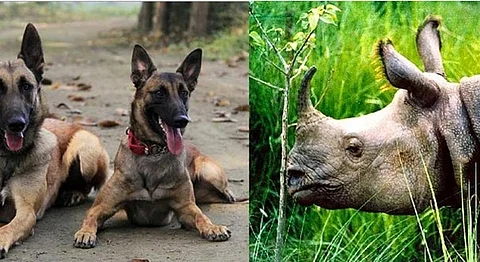
- HOMEGROWN WORLD
- #HGCREATORS
- #HGEXPLORE
- #HGVOICES
- #HGSHOP
- CAREERS
- ABOUT US
- CONTACT US

A recent US study has seen a growing concern among environmentalists and climate change activists. The joint study by Stanford, Princeton and Berkeley Universities declared that Earth has entered the ‘Sixth Great Mass Extinction Event,’ which might see humans being the first casualty. Scientists found that the current extinction rate was 100 times higher than a period when Earth wasn’t facing a mass extinction event at all and while this may have come as a surprise to the general public, those who have been tracking the endangered and extent species for decades, saw it as just a matter of time. The dwindling population of the one-horned rhino in Assam’s Kaziranga National Park serves as further proof of the pending disaster.
Nine one-horned rhinos have been killed at the Kaziranga National Park in 2015 with particularly daring poachers even attacking and killing Assam Police Commandos who get in their way. Considering it’s the world’s largest concentration of some of the only remaining one-horned rhinos, the park has now turned to a new, unconventional yet effective means of counting poachers — sniffer dogs.
The 23rd Battalion of the Madhya Pradesh Special Armed Force in Bhopal undertakes training of sniffer dogs over a period of nine months, where they are taught to sniff out wildlife parts right from tiger and leopard parts and skins, to bear bile, and rhino horns. These dogs are trained to not only patrol wildlife areas vulnerable to poaching but also scan baggage at airports, bus stations and railway stations, which serve as transit points for the gruesome trade. TRAFFIC India, a wildlife trade monitoring network of Worldwide Fund for Nature and International Union for the Conservation of Nature, has been helping India since 2008 in training dogs for the anti-poaching initiative, including the contribution of Kareena, a German Shepherd to Kaziranga.
Kaziranga got its first canine detective in 2013 with Jorba, who was imported from Slovakia by Guwahati-based conservation body Aaranyak. The five-year-old dog has since led the forces to more than 10 arrests with a success ratio of more than 60 percent, even tracking a poacher for 1.5 km before he was cornered by forest officials and killed in an encounter. Jorba and Kareena are now being joined by Babli, a Belgian Shepherd being bought by Aaranyak too.
The forest officials often face the daunting task of getting poachers convicted due to the lack of evidence. “Dogs solve this problem by finding all possible evidence like the weapon used by the poacher or a body part taken away by them. They can also find the poacher by tracing their exit route from the scene of crime,” said Bibhab Talukdar, Aaranyak’s general secretary.
The latest census showed that the rhino population in the park stood at 2,401 while the West African Black Rhino was declared extinct this year. “Dogs have proved to be very effective in anti-poaching operations. Our forests need a good number of these canines. They give us especially vital clues, even trace poachers or wildlife articles after the crime has been committed,” Dr Shekhar Kumar Niraj, head of TRAFFIC told PTI as one hopes that these serve as vital defence to prevent a similar fate for the India’s one-horned rhinos.
